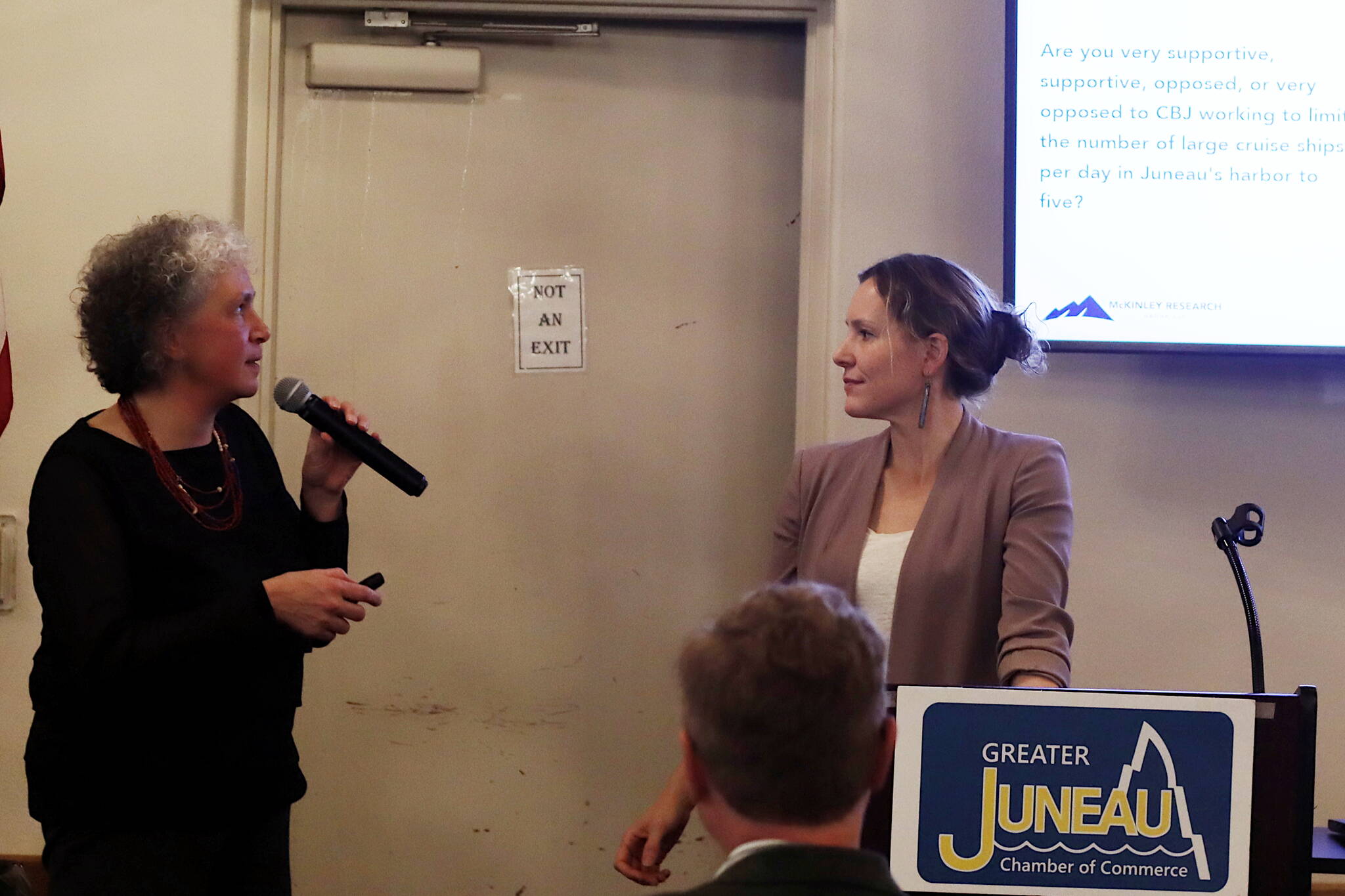Businesses can celebrate a return to near-normal cruise tourism this year and a potential record number of passengers next year, but also need to accept most residents want limits on the number of big ships docking daily, a local research firm president and the city tourism’s director told members of the Juneau Chamber of Commerce on Thursday.
Results of an annual tourism survey – whose broad findings were unveiled last month, with the final report expected to be available on the city’s website next week – were discussed at the chamber’s weekly luncheon by McKinley Research Group president Susan Bell and CBJ Tourism Manager Alexandra Pierce. A centerpiece finding of this year’s survey is 46% of respondents are very supportive and 28% are somewhat supportive of limits on large cruise ships.
“We asked the question a few different ways and again we saw a similar level of support for this year for overall priorities,” Bell said. “What rose to the top for most people was limiting the number of cruise ships to five.”
Among the phrasings was asking respondents if the city should place a high, medium or low priority on seven different issues. Limiting large ships to five per day ranked first with 60% ranking a high priority, followed by reducing traffic congestion at 55%, shore power at 50%, developing public transit for visitors at 42%, additional hotel capacity at 40%, renovating Centennial Hall to allow for more conferences at 34% and extending the Seawalk at 34%.
The survey also asks a range of nuanced questions about addressing impacts of large-scale tourism, but the bottom line among residents is essentially “not in my back yard.”
“Guess what? Downtown residents said spread them out. Valley residents said keep them contained,” Bell said.
There has been some shift by respondents during the past 20 years about whether the city is doing the proper level of management in terms of tourism impacts, she said. In 2002 a total of 52% said not enough, 34% said the right amount and 6% said more than enough. This year’s responses were 45% not enough, 41% the right amount and 4% more than enough (the latter being an oddity in that it spiked above the 2002 figure in surveys in 2007 and 2021 before dropping below it this year).
The cruise industry rebounded from two years of COVID-19 collapse with ships at 74% capacity this year, which “felt like a full season although we didn’t have the same volume of people operating companies that we traditionally have,” Pierce said. Next year at full capacity would result in a record 1.65 million passengers.
“We’re also seeing cruise lines with record bookings,” Pierce said. However, when it come to whether that will carry over to Juneau next year “we don’t know, so it’s anyone’s guess.”
An important distinction in assessing residents’ perceived impression on cruise tourism impacts is the number of big ships in port verses the number of passengers, she said. The former, which currently is four ships docked and one at anchor, appears to be the more important focus.
“We asked very specifically about the five-ship limit, recognizing that’s our current capacity,” Pierce said. “It feel a little bit unrealistic to go back in term of port capacity.”
Capping the number of ships means “there is still the opportunity for the industry to go up a little bit on the basis of the (passenger) spaces that are there now,” she said. Putting a limit on passengers, on the other hand, seems arbitrary, and raises questions about how city officials could monitor and enforce such limits.
Questions from business leaders focused primarily on specific problems and remedies, rather than the community’s collective attitude about putting some limits on cruise tourism. One inquiry focused on “confusing” free circulator buses downtown and why the city is struggling to come up with a system that works.
“It seems like historically nobody’s been able to agree on what the circulator is,” Piece acknowledged. She said while a study seeking a practical solution is ongoing “I think there’s also been some concern about private sector competition.”
She added: “We’ve also had this free downtown bus service that doesn’t really operate the way a robust network should operate.”
The same concern applies to other deficiencies the city is trying to address, such as the nearest city bus stop to the Mendenhall Glacier being a mile away, which many tourists don’t want to walk both ways and yet can’t take a private shuttle because they’re full with prebooked tour passengers, she said.
“The city is not interested in competing with private transportation operators, but we do want to create a system that works,” Pierce said.
• Contact reporter Mark Sabbatini at mark.sabbatini@juneauempire.com

